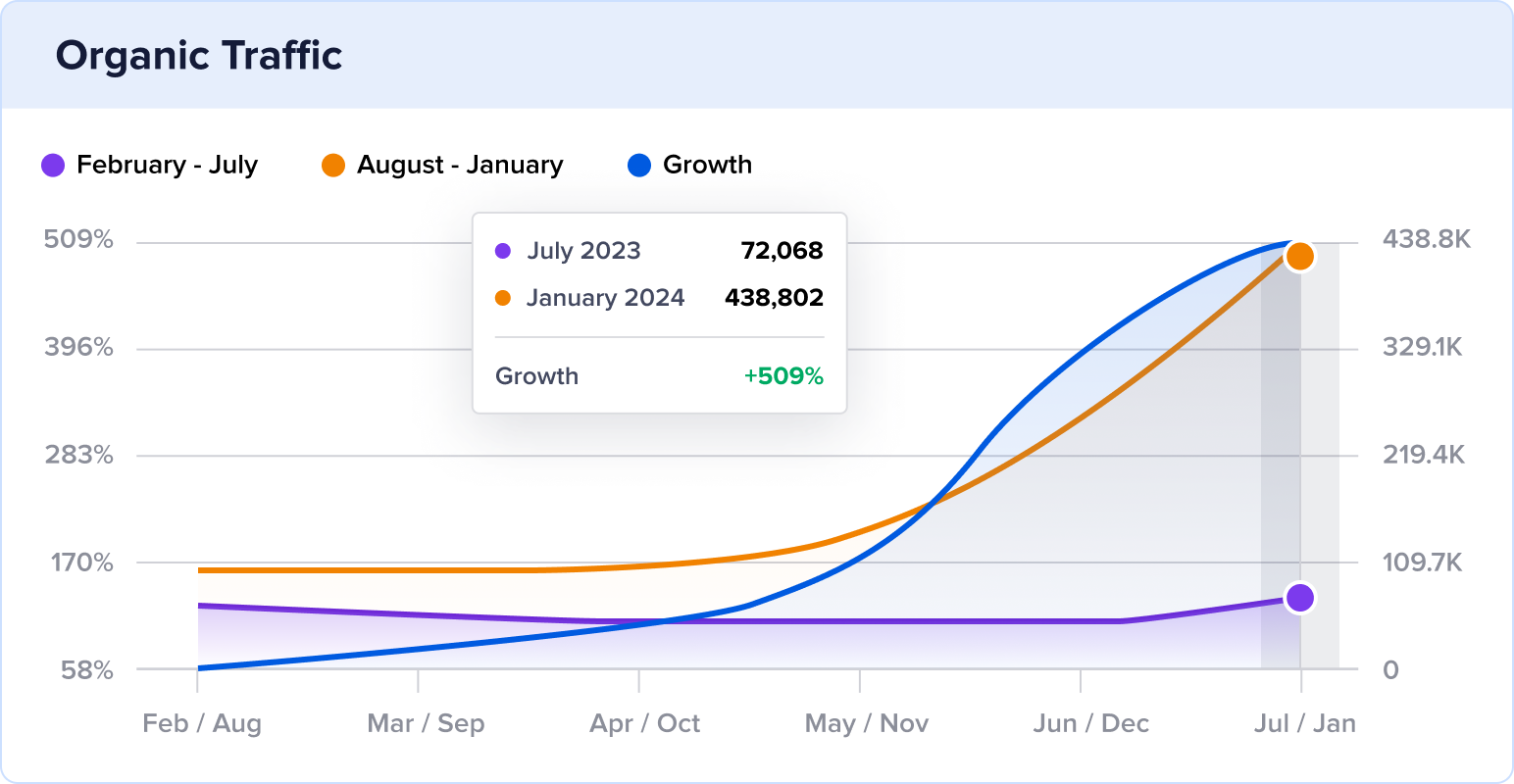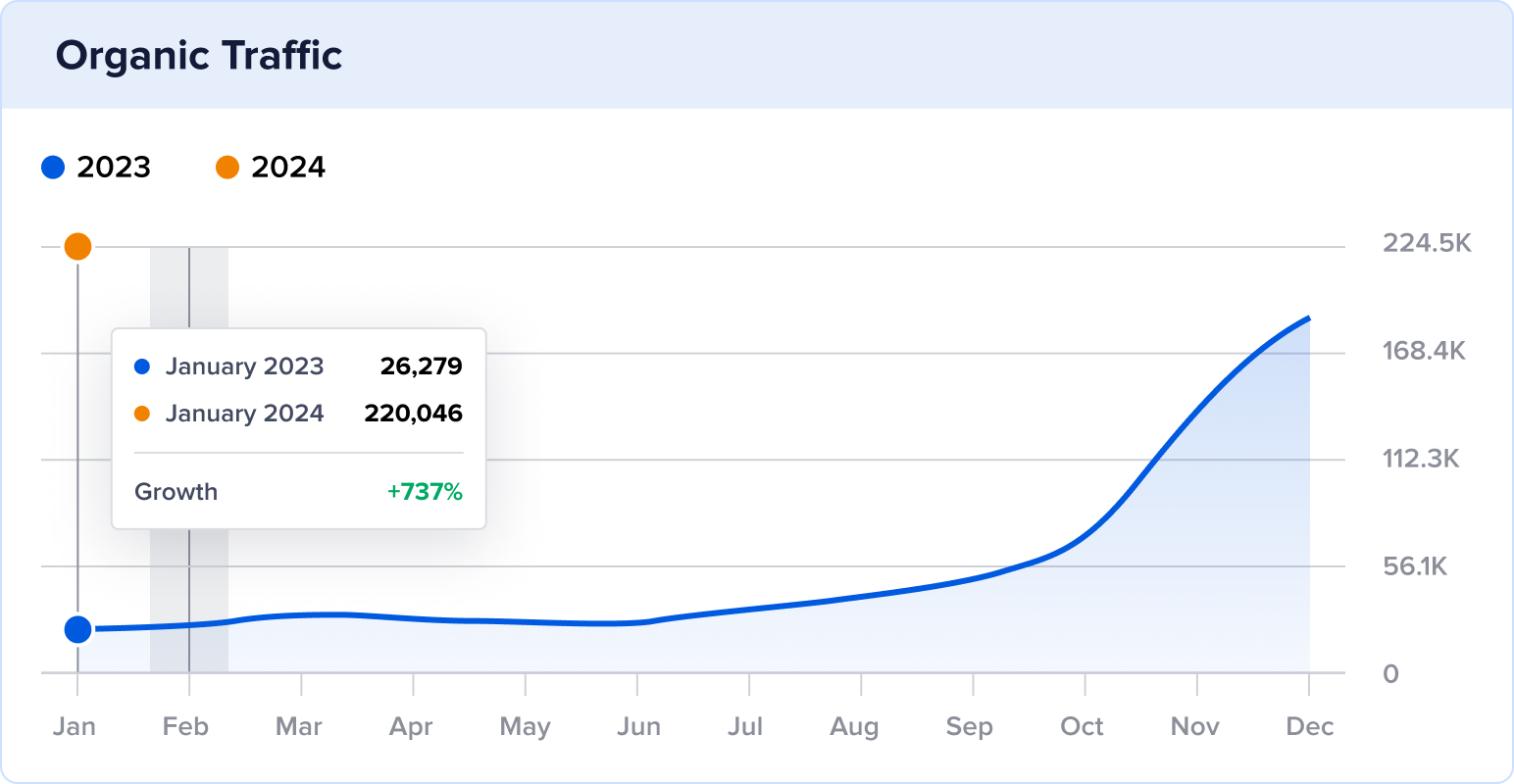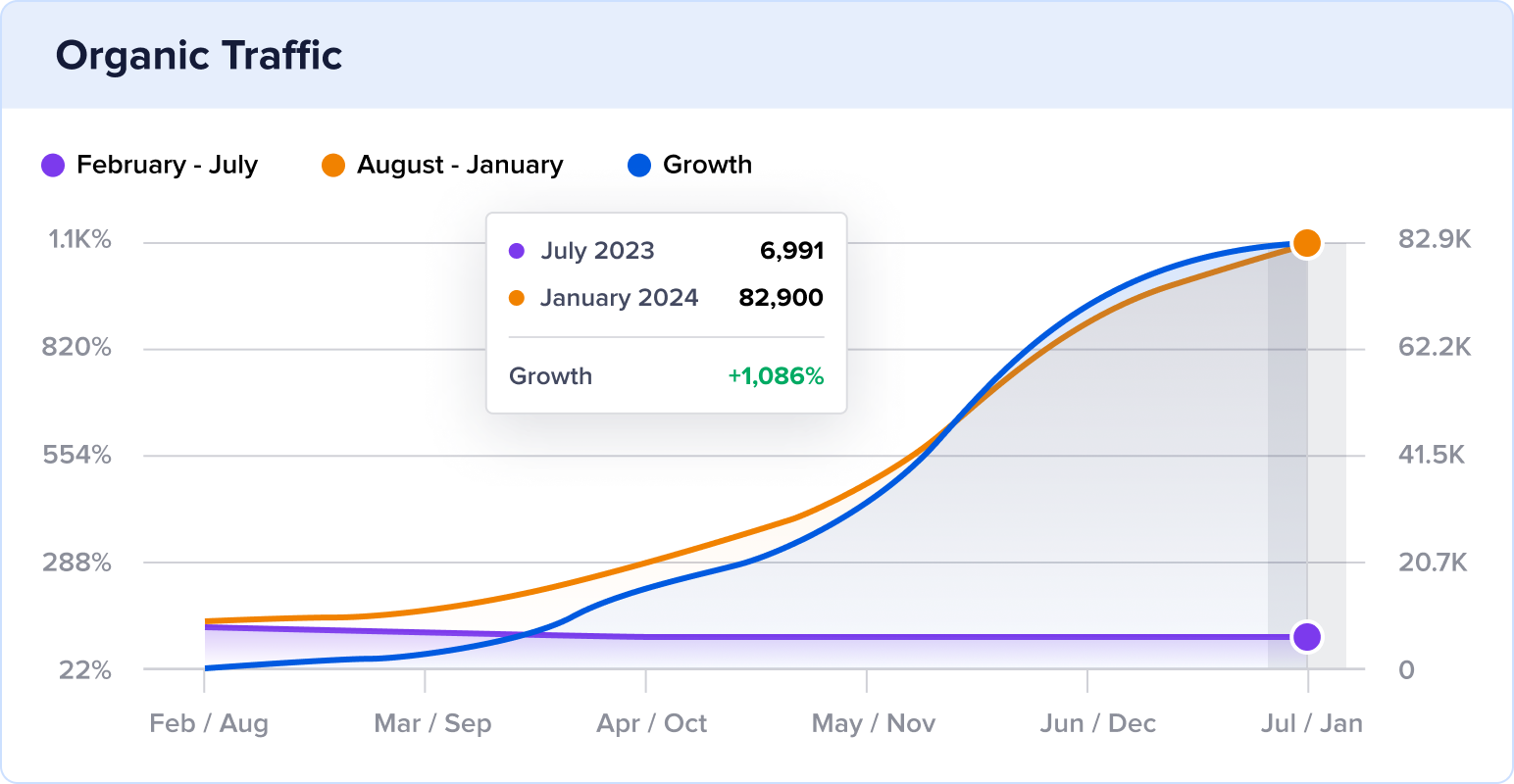How a Cybersecurity Site Catapulted Traffic by 3,336% YoY
https://allaboutcookies.org/
Stats
25.2K to 865.6K Monthly Visits
Industry
Web & Tech
Niche
Cybersecurity
Reporting Date
October 2023
In today’s age, cybersecurity is more prevalent than ever. However, navigating security protocols isn’t exactly second nature for the average non-technical user.
That’s where allaboutcookies.org comes into play.
This cybersecurity site is on a mission to make a safe internet experience accessible to all.
In this SEO case study, we’ll explore how they’re crafting high-quality content to reach their digital audience—one rich result at a time.
They’ve achieved a staggering 3,336% year-over-year (YoY) growth, and you’re about to learn exactly how they did it.
Let’s dive in.
In This Article
About All About Cookies
All About Cookies is an informational hub for all things related to online privacy and data security.
They cover topics like antivirus protection, VPNs, password managers, and more.
How-to tutorials and software reviews/recommendations remain the crux of their content, bringing in 56% of site traffic.

Overall, All About Cookies aims to craft clear, engaging guides that avoid tech jargon.
They simplify complex subjects to help users make informed decisions on their browsing experience.
Historical Performance
All About Cookies first appeared online in June 2003.
A visit to the Wayback Machine reveals that the website’s purpose as a cybersecurity resource has remained remarkably unchanged during its 20-year existence.
As for performance, we’ll use the chart below to focus on the past 10 years.
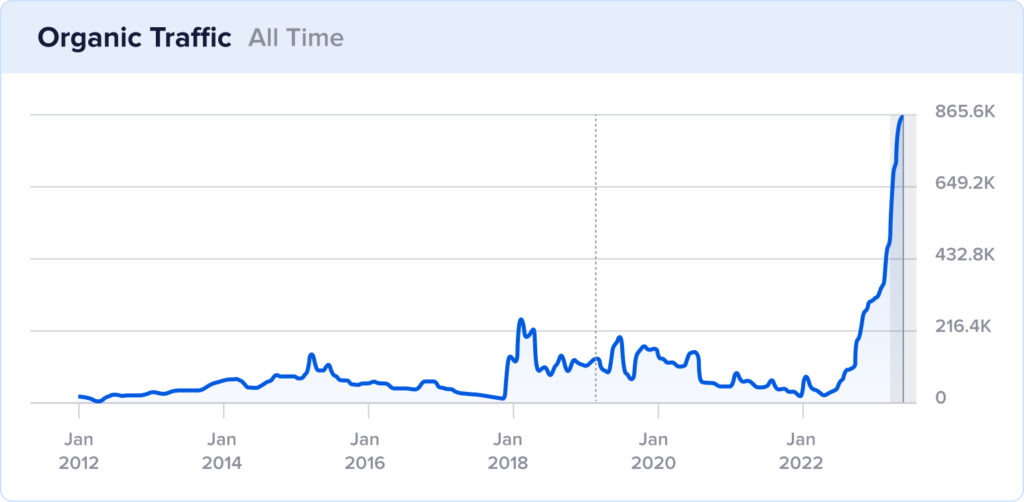
We can categorize this growth into three brackets. Below, we see the average annual visits for each respective timeframe:
- 2012 – 2017: 587,623
- 2018 – 2022: 1,163,843
- Jan – Oct 2023: 3,649,957
With this perspective, it becomes clear that 2023 is setting a new course for the site’s performance.
In only 10 months, All About Cookies has more than doubled even its highest-performing years’ traffic.
So, how’d they get here? And what kicked off this seismic shift in growth?
We’re revealing those answers next.
The Catalyst: How All About Cookies Achieved 3,336% YoY Growth
Allaboutcookies.org grew its organic traffic by performing the following:
- Publishing content aligned with the buyer’s journey
- Winning featured snippets
- Optimizing for the People Also Ask box
- Implementing product schema
Let’s examine each strategy to see how they contributed to the site’s newfound organic success.
1. Publishing Content Aligned With the Buyer’s Journey
In 2023, All About Cookies ramped up its content production. They added 590 pages to the site, bringing the total to 792 URLs.
(This is a stark difference from the years prior, where URLs were typically in the 130-200 range.)
Of these new pages, 5 types of content took the lead, which we’ll outline shortly. But first, we want to address the intent behind their content strategy.
All About Cookies caters to its marketing funnel with all this new content.
A marketing funnel models a customer’s buying journey. A different type of content supports each stage to serve the customer’s needs at that moment.
Marketers segment this model into the following three categories:
- TOFU (Top of the Funnel) – The initial stages of research. Search queries have an informational intent.
- MOFU (Middle of the Funnel) – They’re looking for more specific information and getting closer to buying. Commercial intent.
- BOFU (Bottom of the Funnel) – They’re on the brink of making a purchase. Transactional intent.
Here’s a visual representation of how these categories align with the customer’s buying journey:
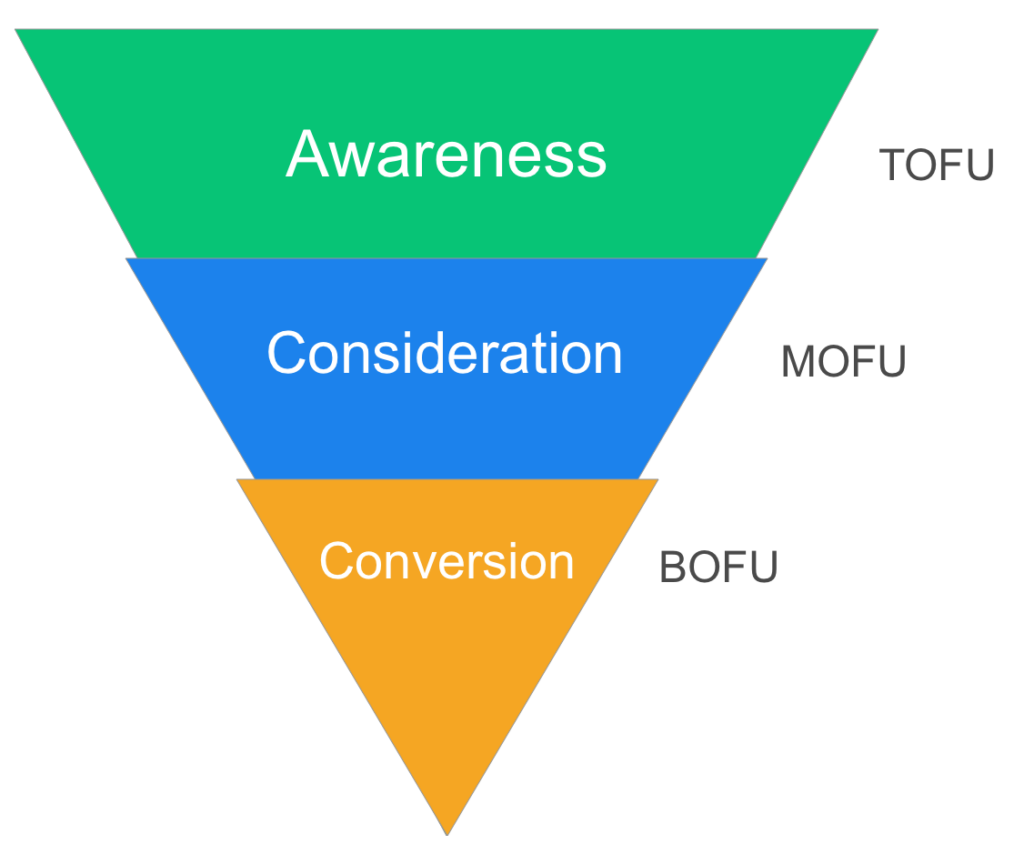
Now, let’s look at how All About Cookies addresses each stage with their 5 types of content.
- Reviews (119 new pages): All About Cookies grew its portfolio of reviews on software, services, and tools. Each article focuses on a specific product, covering features, pros and cons, test results, FAQs, and more. They’re comprehensive yet easily digestible. (MOFU/BOFU)
- Best of lineups (90 new pages): In these articles, All About Cookies showcases the best products for a specific category. They discuss prices, features, what they like/dislike, and the ideal user for each product. These curated lists simplify the decision-making process for users, guiding them to the best product for their needs. (MOFU)
- Versus (82 new pages): Products go head-to-head to see who comes out on top. They compare features, pricing, and any relevant information to aid the user’s final buying decision. (BOFU)
- How-Tos (68 new pages): Recognizing the power of actionable advice, All About Cookies dedicates much of its content to How-To guides. These step-by-step tutorials empower users to navigate and implement safe browsing measures. They’re also some of the biggest drivers of All About Cookies’ traffic. (MOFU)
- What Is (35 new pages): These articles address basic questions like “What is X?” and “Do I need X?”. They help users understand fundamental concepts or technologies in the cybersecurity space. (TOFU)
Why this matters:
When used effectively, the marketing funnel can be a powerful tool to drive more targeted traffic and higher conversion rates. There’s less competition further down the funnel you go, with a higher readiness to convert.
The marketing funnel is also about serving the customer at every stage of their buying journey.
This also allows you to reach your entire audience.
As for All About Cookies’, it’s no secret that more content comes with more ranking opportunities.
And more traffic—when done right.
All About Cookies’ content efforts proved fruitful, surpassing the quarter-million mark (259K) for ranking keywords in October 2023.
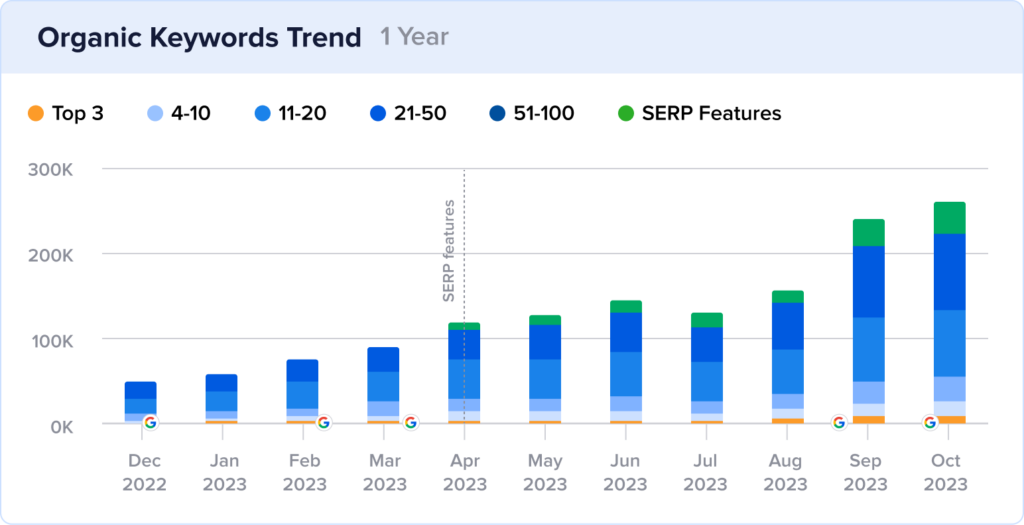
How to use the marketing funnel in your content strategy:
Our TOFU – MOFU – BOFU Guide breaks down the marketing funnel into an actionable content strategy. You’ll learn how to address each stage of the buyer’s journey and the type of content to go with it.
Ultimately, we recommend aiming your efforts toward MOFU and BOFU content. Keywords in these stages are easier to rank for and have high buying intent.
For a well-rounded user experience, you should also sprinkle in TOFU content.
Tools for optimizing TOFU – MOFU – BOFU content:
On-page optimizations can make the difference between your content getting noticed and never seeing the daylight of the SERP.
Our TruSEO On-Page Analysis can help ensure your pages are part of the former.
TruSEO analyzes your optimization efforts and gives you a checklist of actionable items to maximize its reach. And it does this directly in the WordPress editor, making SEO a breeze.
Here’s an example of the Readability Checklist from TruSEO:
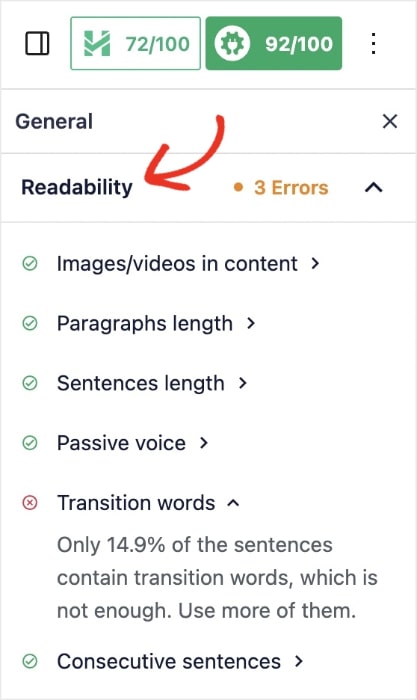
Now, let’s look at how this content appears on the SERP.
2. Winning Featured Snippets
October brought a record-breaking number of featured snippets for All About Cookies.
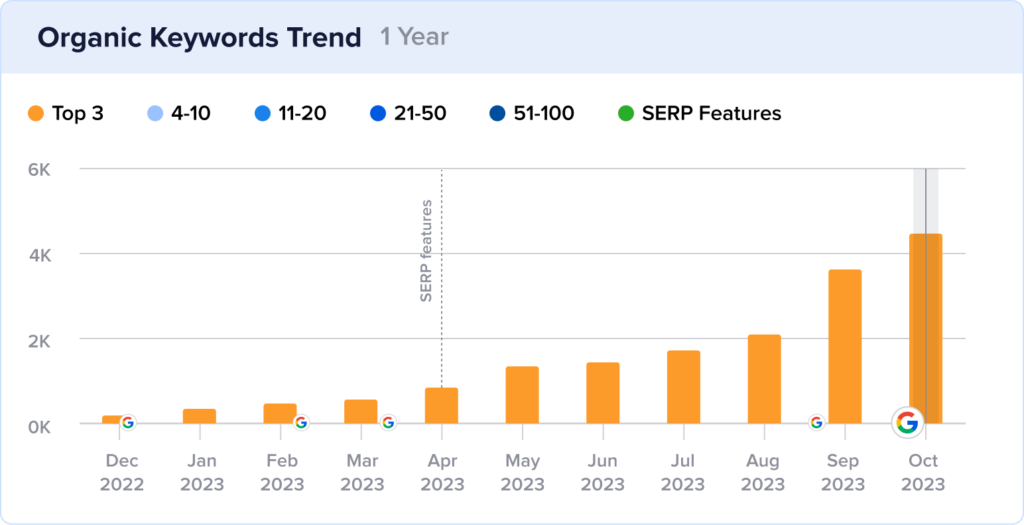
A featured snippet is an enhanced search result that appears above all other organic results (often called position 0.) They answer the user’s query or provide additional context directly on the SERP.
Here’s an example of one:
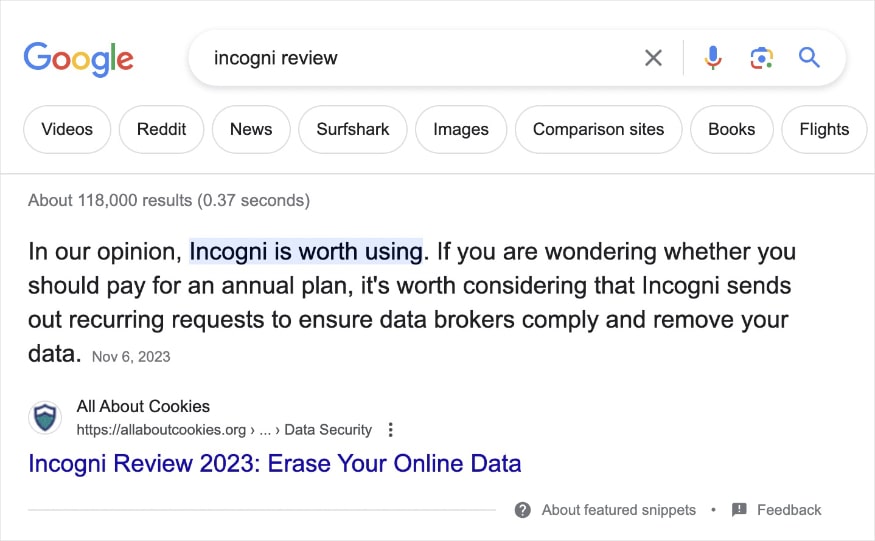
How-to tutorials are another common sighting in featured snippets. These provide users with clear, step-by-step instructions to help them attain their desired outcome.
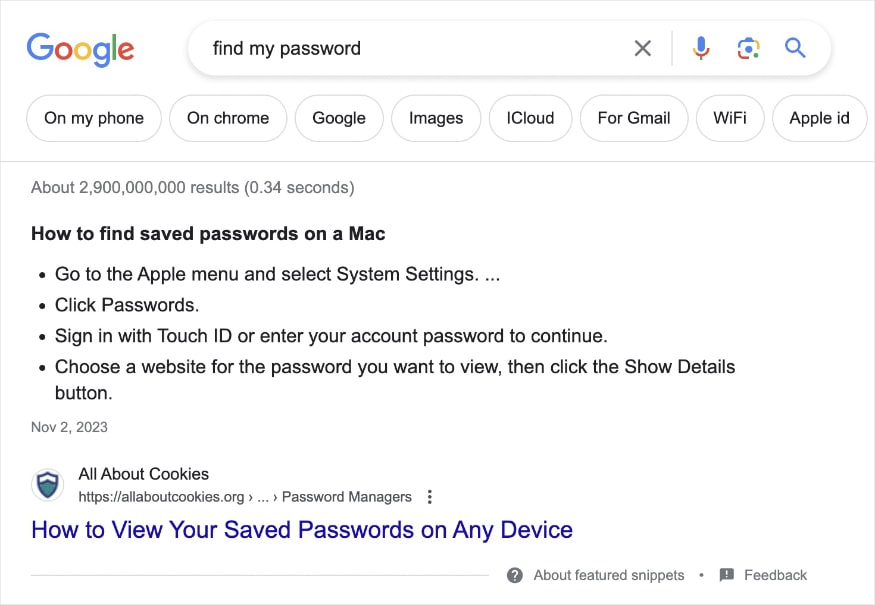
Why this matters:
Featured snippets are some of the most covetable results your website can get. They bring a range of benefits, including:
- Greater visibility
- Higher clickthrough rates (featured snippets get 35.1% of all clicks)
- Increased organic traffic
- More authority in your niche
To show you just how powerful these results can be, here’s a look at how All About Cookies is bringing significant traffic from just 5 featured snippets:

It’s also worth noting that the top 3 are for extremely competitive keywords, and All About Cookies brings in about 25% of all traffic per keyword. That’s impressive!
How to get featured snippets for your site:
This tutorial gives you step-by-step instructions for how to get featured snippets on Google.
Here’s an overview of the process:
- Implement schema markup.
- Optimize your content structure for featured snippets.
- Use a table of contents.
- Create the best piece of content for your keyword.
- Look at the competition.
All About Cookies follows these best practices and uses them to win coveted spots in position 0.
Tools for featured snippets:
With AIOSEO, you get a suite of tools to help you win more featured snippets. Some of these include:
- Schema Generator – Choose your preferred schema type in our Schema Catalog and add it with a click of a button. You don’t have to code; we’ll implement it properly for you.
- TruSEO Analysis – Get helpful tips and actionable insights for optimizing your content. This tool reviews your content structure, keyword placement, and more to maximize its reach.
- Table of Contents Block – Manually adding a table of contents (ToC) in WordPress can be a hassle. Instead, use AIOSEO to add a ToC block that automatically populates from your subheadings.
- SEO Analysis – Peak on your competition with a quick and easy competitor analysis. You’ll see their keyword targets, metadata, image optimizations, and more. (You can also use the free AIOSEO Chrome Extension to get these insights right in your browser!)
Now, let’s see how All About Cookies is dominating another area of the SERP: Google’s People Also Ask.
3. Appearing in Google’s People Also Ask
Position 0 isn’t the only valuable place for your website to appear. The People Also Ask (PAA) box is another eye-catching source of traffic.
Google’s PAA section serves a similar purpose to the featured snippet. It answers the user’s query directly on the SERP. The difference is its positioning.
While featured snippets are at the top of organic results, PAA snippets appear under featured snippets or after the first organic result.
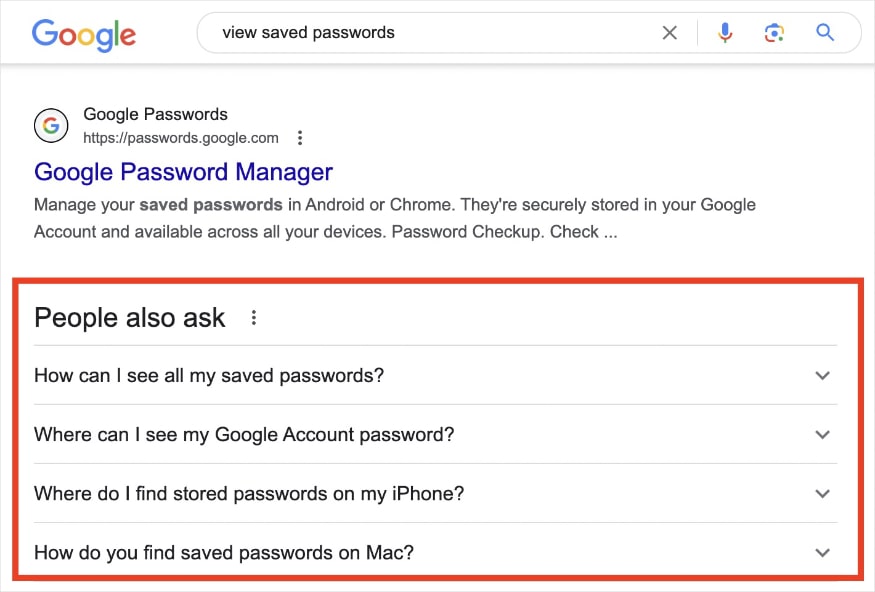
PAA snippets also have an accordion-like appearance, which the user expands to reveal the answer.
In October, All About Cookies ranked in the PAA section for 38K keywords—their highest to date.
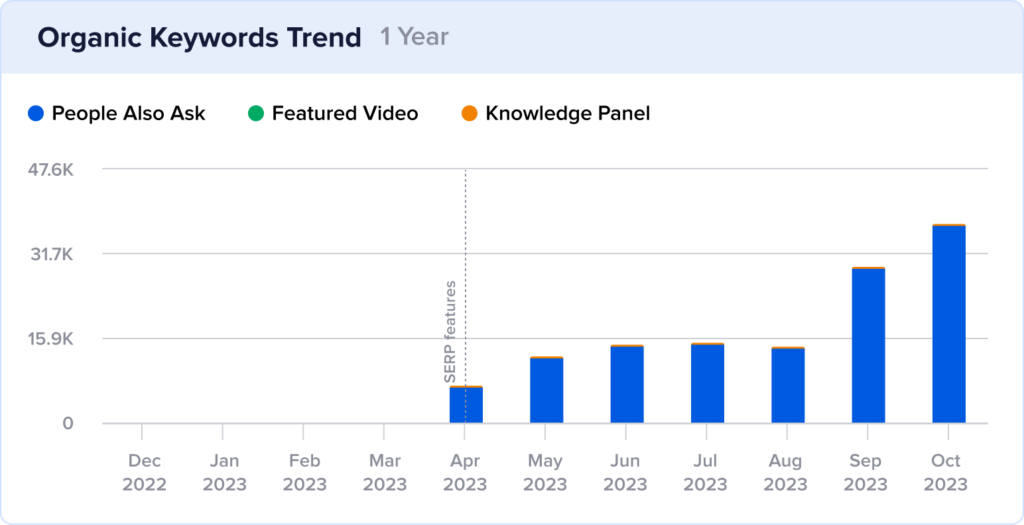
Why this matters:
Like featured snippets, PAA results increase visibility, clicks, and traffic.
It’s also a great way to establish your site’s authority.
Users are more likely to trust information presented directly on the SERP, establishing your website as a go-to resource in your niche.
Ultimately, creating a strong online presence comes down to visibility.
Optimizing for the various elements on the SERP gives you more opportunities to encourage content discovery and boost brand awareness.
How to optimize for the PAA box on your site:
To get these types of search results, your content needs to be up to par. High-quality content should always remain the focus of your efforts.
Here are some ways to guide your content creation process to win PAA results:
- Perform keyword research for question-based queries.
- Create user-centric content that answers search intent.
- Add FAQ schema.
- Conduct a competitor analysis.
For an in-depth explanation of each step, this guide tells you exactly how to optimize for Google’s PAA box.
Tools for PAA results:
AIOSEO can help you with each step in the above list, but let’s focus on our FAQ schema tools.
FAQ schema is a must-have when optimizing for PAA results. It signals to search engines that you’re answering a question, which can then be served as a rich result on the SERP.
Typically, custom schema occurs in the backend of your website. But with our FAQ blocks, you can write your FAQs directly in the WordPress editor. It’s as simple as locating the block and clicking it.
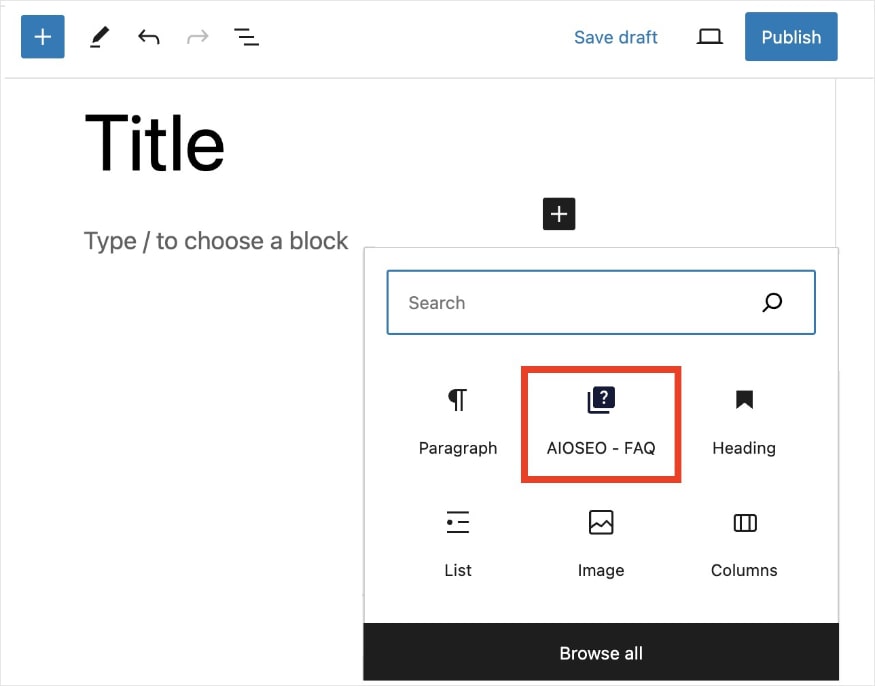
Then, you write your question and answer, and that’s it!
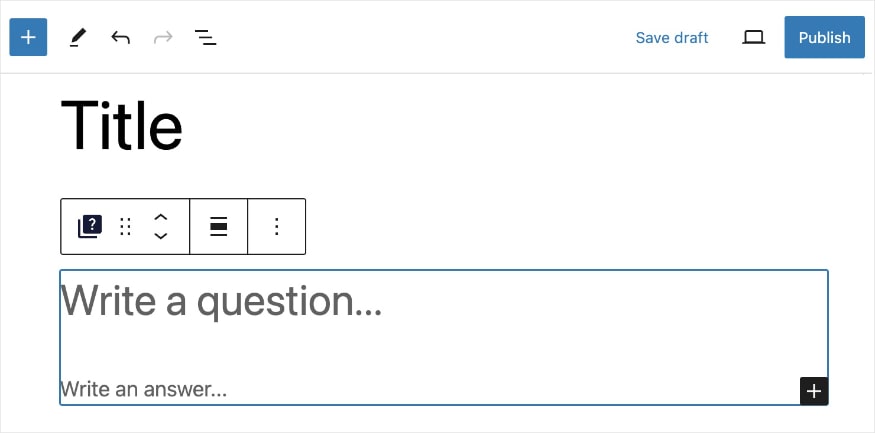
We’ll implement the schema markup behind the scenes so you have a better chance of winning a PAA result.
Note: Implementing schema markup does not guarantee a rich result. Nevertheless, it’s a core SEO best practice to include it. Schema markup plays a strong role in websites wanting to achieve higher rankings.
Next, we’re going to look at another schema type that’s been a game-changer for All About Cookies’ traffic.
4. Implementing Product Schema
Product schema allows you to share important product details with search engines. This information can then be transformed into a rich result on the SERP.
Some product attributes include:
- Brand
- Reviews/Ratings
- Price
- And more
What’s interesting about All About Cookies’ use of product schema is that they don’t actually sell a product. But they do write about them and use affiliate links.
This is important because more eyes on their content = more affiliate revenue.
Below, we see how All About Cookies’ product schema has been transformed into a rich result on the SERP.
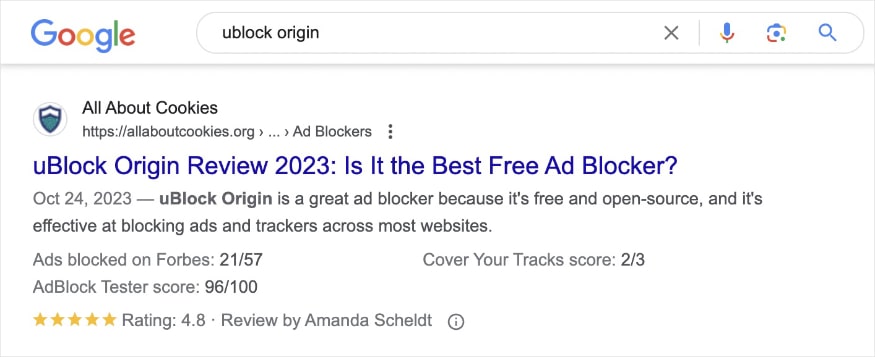
Not only is there a 4.8-star rating, but we also know who wrote the review (author attribute).
Why this matters:
Details matter in search results. Anything that helps your site stand out from the competition increases your chances of earning a user’s attention.
Reviews are particularly impactful for eCommerce. 99.9% of consumers read reviews when shopping online.
By showcasing a high rating directly on the SERP, you’re already gaining a user’s trust. The content then allows you to hit the home run.
In All About Cookies’ case, their use of product schema has earned significant rankings for review snippets.
September was their peak at 20K, and October boasts 17K rankings.
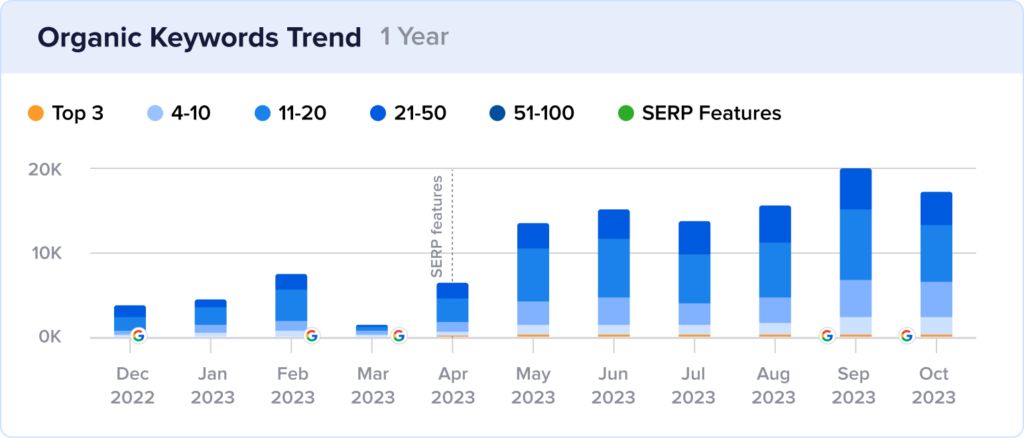
How to implement product schema on your site:
This guide shows you how to add schema markup without a plugin. It uses three different methods, and each requires you to obtain and copy code snippets into the appropriate fields.
You’ll need to select the appropriate product schema and attributes when performing this process manually.
Tools for product schema:
If you get nervous about touching your website’s code, you’re not alone. Many website owners don’t feel comfortable using JSON-LD.
The good news is that there are product review plugins that do the coding for you.
In AIOSEO’s Schema Catalog, you can select Product from the list. Then, we’ll walk you through easy-to-fill-in fields for your attributes.
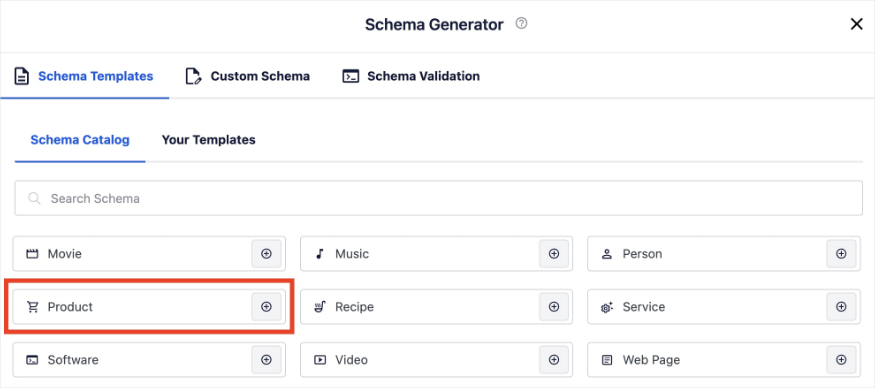
For a complete tutorial, check out this guide on how to add product review schema in WordPress.
Standout SEO Wins
Before we conclude, there’s an additional SEO technique worth highlighting at allaboutcookies.org.
1. They use canonical tags effectively.
Canonical tags tell search engines where to go when you have multiple URLs with similar content. It basically tells them which one you prefer. It also lets them know which URL to rank in search results.
Canonical URLs are extremely useful for avoiding duplicate content issues.
Even if you only have a unique page (meaning no duplicates), John Mueller from Google still recommends using a self-referencing canonical.
All About Cookies adheres to this best practice.
Tool: Canonical tags don’t have to be intimidating when you have the right tools. In AIOSEO, you can customize and manage canonical URLs easily.

Takeaways
In our analysis of allaboutcookies.org, we’ve uncovered how a robust content strategy, killer content, and rich results have skyrocketed its organic growth.
Now, let’s review which strategies to grow your website traffic and others to reconsider.
Top 3 Strategies to Emulate
- Create a content marketing funnel. Understanding the buyer’s journey can significantly impact how you proceed with your content strategy. Once you understand the thought process of your buyers, you can tailor your content to have more effective messaging and a greater return on investment (ROI.)
- Optimize for all areas of the SERP. The key to winning more traffic is having a stronger presence on the SERP. Optimize for all its elements, like featured snippets, the PAA box, and rich results for increased visibility.
- Implement schema markup. Schema markup goes hand in hand with winning the enhanced search results mentioned above. It’s easy to implement with our Schema Generator and can make a huge difference in how your site appears on the SERP.
Bottom 3 Strategies to Reconsider
- Neglecting image title tags. All About Cookies does a good job optimizing its image alt text, but they overlook title tags. Image title tags appear when users click or hover over an image. They provide context and help search engines understand (and rank) the image. You can even have image title tags written for you with AIOSEO’s image SEO feature.
- Exceeding character limits for meta titles. Character limits ensure your meta titles do not get truncated on the SERP. Some of All About Cookies meta titles exceed these limits, leading to the dreaded ellipses. WordPress users have two options to fix this issue: (1) Use an SEO title tag generator to write them or (2) run your titles through a SERP snippet tool.
- Using non-descriptive anchor text. Most of All About Cookies’ anchor text is descriptive, meaning you know what you’re going to get when you click a hyperlink. However, some use generic wording like “see more” or “click here.” It’s best to avoid this when possible. Link Assistant can suggest internal linking recommendations for your content and the anchor text to go with it.
Steal Our SEO Winning Strategy: A Checklist for Your Website
Are you ready to join the winning ranks of exploding sites like All About Cookies?
SEO success isn’t unattainable, and you can get all the insider details with our exclusive SEO Checklist.
Download A Free SEO Checklist
Access our comprehensive SEO Checklist with a single click. We’ll deliver it straight to you, putting actionable items with SEO tools and tutorials right at your fingertips.
Enter your name and email to download a free SEO checklist.
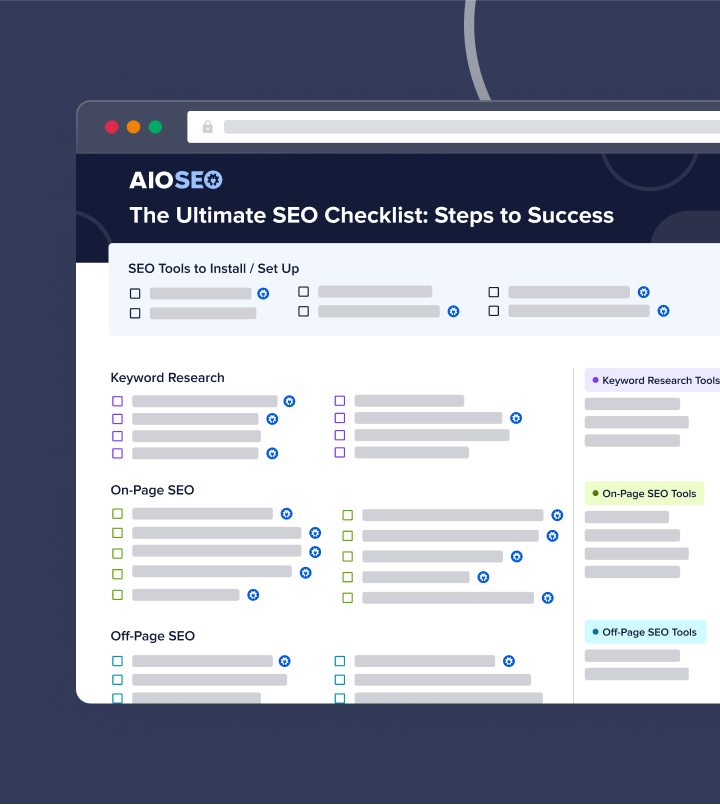
Dominate the SERP and Win More Rich Results With AIOSEO
If you want a direct route to SEO success, AIOSEO has you covered.
You get a suite of powerful tools to help you boost your website’s rankings and organic traffic.
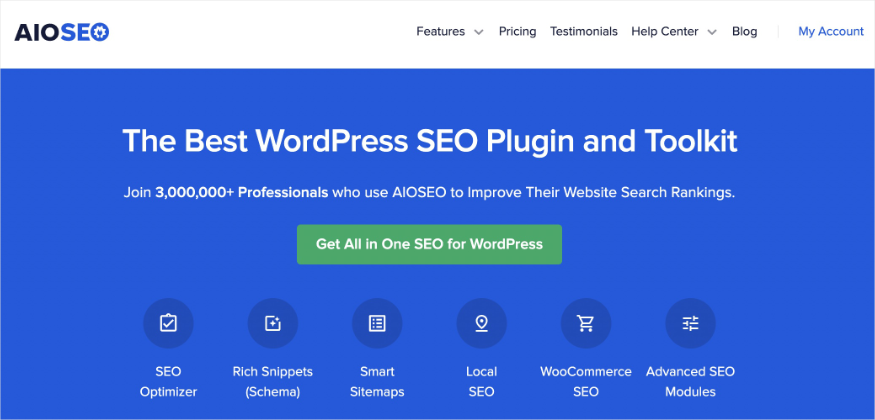
All in One SEO is the best WordPress SEO plugin on the market, and you don’t just have to take our word for it. With thousands of 5-star reviews and trusted by over 3 million website owners, AIOSEO is your all-inclusive toolkit for taking your website’s SEO performance to the next level.
Here are some features you’re going to love:
- TruSEO On-Page Analysis: Get a comprehensive but easy-to-understand analysis of your optimization efforts. Each page includes an actionable checklist to help you maximize your content’s reach.
- Schema Generator: Pick and embed schema markup from our catalog—without touching code. Websites with schema markup get more rich results on the SERP, a proven way to win more traffic to your site.
- SEO Competitor Analysis: Investigate your competitors’ optimizations and find opportunities to steal their traffic. You need to know what the competition is doing to stay ahead.
- Image SEO: Turn on automatic image alt text and title tags with a single click. You’ll save time from manual entries while helping users and search engines understand your images.
- AI Title & Description Generator: Write metadata faster than ever with this groundbreaking tool. It uses AI to generate unique and click-worthy metadata for your content.
- Link Assistant: Get link suggestions, edit anchor text, and add internal links to your content in the WordPress editor. Link Assistant makes internal linking a seamless step in your content creation process.

